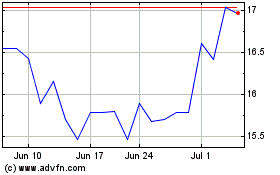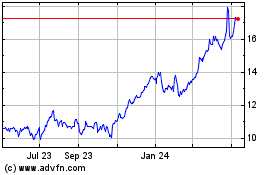Deutsche Bank Shares Tumbled to a 30-Year Low After Fed, IMF Rebuke
June 30 2016 - 5:57AM
Dow Jones News
By Friedrich Geiger and Hans Bentzien
FRANKFURT--Deutsche Bank AG shares tumbled to a 30-year low
Thursday morning after the International Monetary Fund and the
Federal Reserve delivered the German lender a double whammy, saying
it posed a significant risk to financial stability.
The IMF said Deutsche Bank was the riskiest financial
institution in the world as a potential source of external shocks
to the financial system. That came right after a U.S. unit of
Deutsche Bank was one of just two banks to fail the Federal
Reserve's "stress test," an exercise measuring how 33 banks would
fare in a new financial crisis.
Deutsche Bank shares traded down 3.5% at EUR12.22 ($10.11) at
0900 GMT, after touching an intraday low of EUR12.05, the lowest in
30 years. Deutsche Bank and other banking shares already plummeted
Friday and Monday in the wake of the U.K. referendum to leave the
European Union.
A trader said the Fed's criticism of Deutsche Bank's capital
planning could render future capital measures, such as a capital
increase, more difficult. The bank is in the midst of a
wide-reaching overhaul, after posting a EUR6.8 billion loss for
2015.
ING analyst Suvi Platerink Kosonen said "after last year's
performance, the failures don't come as a surprise." He noted that
the Fed didn't examine all of Deutsche Bank's U.S. operations.
Bill Woodley, an executive with Deutsche Bank in the U.S., said
"the capital adequacy of Deutsche Bank Trust Corporation has never
been in doubt," and "we will implement the lessons learned this
year in order to strengthen our capital planning process."
It was the second year in a row that Deutsche Bank failed the
Fed's stress test.
The IMF said in its Financial Sector Assessment Program: "Among
the G-SIBs (globally systemically important banks), Deutsche Bank
appears to be the most important net contributor to systemic risks,
followed by HSBC and Credit Suisse."
The institution also said the German banking system poses a
higher degree of possible outward contagion, compared with the
risks it poses internally.
"In particular, Germany, France, the U.K. and the U.S. have the
highest degree of outward spillovers as measured by the average
percentage of capital loss of other banking systems due to banking
sector shock in the source country," the IMF added.
The importance of Deutsche Bank emphasizes the need for risk
management, intense supervision and monitoring cross-border
exposure, as well as the ability of globally systemic banks to
carry out new resolution regimes, IMF said.
A Deutsche Bank spokesman declined to comment on the IMF
assessment.
Germany needs to examine whether its resolution plans for banks
are operable, including a timely valuation of assets to be
transferred, continued access to financial market infrastructures,
and whether authorities can ensure control over a bank if
resolution actions take a few days, if needed, by imposing a
moratorium, the IMF said.
Write to Friedrich Geiger at friedrich.geiger@wsj.com and Hans
Bentzien at hans.bentzien@wsj.com
(END) Dow Jones Newswires
June 30, 2016 05:42 ET (09:42 GMT)
Copyright (c) 2016 Dow Jones & Company, Inc.
Deutsche Bank Aktiengese... (NYSE:DB)
Historical Stock Chart
From Mar 2024 to Apr 2024

Deutsche Bank Aktiengese... (NYSE:DB)
Historical Stock Chart
From Apr 2023 to Apr 2024
